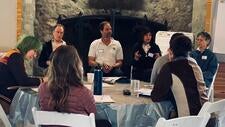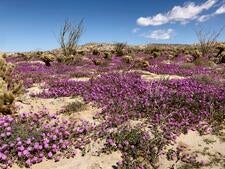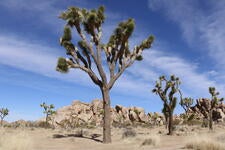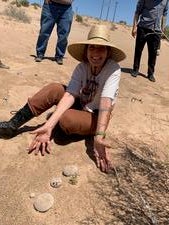Our Projects
What is conservation biology?
Conservation biology is a multidisciplinary science that aims to protect Earth's biodiversity. At the Center for Conservation Biology, our projects look towards creating sustainable pathways that build in the capacity for adaptation and expands research on biology, society, technology, and the wild-land urban interface. Each of our projects center our core principles of conservation research, engagement with stakeholders, and providing training opportunities.
Wildland-Urban Interface Climate Action Network (WUICAN)
Communities throughout Califronia are grappling with a range of climate-related challenges, including drought, wildfire, and severe weather events. The Wildland Urban Interface Climate Action Network (WUICAN) is a joint initiative led by UC Irvine, UC Riverside, and UC San Diego, aimed at connecting community priorities with impactful climate solutions. At UC Riverside, the WUICAN team is focused on strengthening partnerships between the university and Indigenous cultural leaders and allies.
Wildland-Urban Interface Climate Action Network
The Desert Climate Resilience Initiative for the Coachella Valley
The goals of the Desert Climate Resilience Initiative are to improve overall scientific expertise and community engagement around the relationship between native plant communities, climate change, and carbon sequestration potential/stored carbon in the desert alongside building equity within Coachella Valley communties around issues of ecology. Here we seek to improve the state of knowledge about the resilience of desert ecological communities, accessibiity of ecosystem services to the community, and identify priorities for investments in land resources through community partnerships. THE DESERT CLIMATE RESILIENCE INITIATIVE FOR THE COACHELLA VALLEY
Monitoring the Impacts of Climate Change across Ecological Transitions
Joshua Tree National Park sits astride two of the major desert regions of North America, the Mojave and Sonoran Deserts. It is at those transition zones where we expect to see the greatest shifts in species distributions to occur due to the effect of climate change. Our goal is to collect "real data" regarding the current and future distributions of the plants, reptiles, birds, mammals, and bugs of this region. This will create an invaluable archive from which to document how these levels of biodiversity respond to the stresses of climate change. UCR Joins forces with joshua tree national park and citizen scientists
CCB Strategies for the Ecology Education, Diversity and Sustainability (SEEDS) Program
SEEDS at UCR is an active student organization that connects students to opportunities in ecology. We host field trips to explore local ecosystems, workshops for networking and professional development, and socials to build a community of ecology students. We also organize undergraduate research projects to introduce students to research topics and skills in ecology. Students interested in learning more about ecology and conservation, and/or a career in these fields, are encouraged to join.ccb-sEEDS Program




